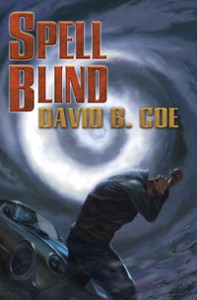 Yesterday I received one of those emails that authors usually hate to get. A reader wrote to let me know that there were a couple of details in my new novel, Spell Blind (book I in The Case Files of Justis Fearsson) that I had wrong. I work hard on my research, and on those occasions when I happen to get something wrong, I am deeply disappointed in myself. And I have received messages in the past from readers who, let us say, did not handle the situation in a socially appropriate way, which makes the whole thing that much worse.
Yesterday I received one of those emails that authors usually hate to get. A reader wrote to let me know that there were a couple of details in my new novel, Spell Blind (book I in The Case Files of Justis Fearsson) that I had wrong. I work hard on my research, and on those occasions when I happen to get something wrong, I am deeply disappointed in myself. And I have received messages in the past from readers who, let us say, did not handle the situation in a socially appropriate way, which makes the whole thing that much worse.
This time, though, the reader in question, did everything right. His email was courteous, informative, and respectful. It was clear to me that he wrote not to criticize, but rather to help. He was even kind enough to tell me that the small inaccuracies he found did not keep him from enjoying the novel. And armed with what he told me, I will be sure to avoid these errors in subsequent volumes of the series. I’m grateful to him for his help, and for his willingness to take the time to contact me.
I’m sharing this with you because I think we can all learn from this gentleman’s professional and thoughtful approach to contacting me. Just about every author has faced this at one time or another. We’re human, and sometimes we get things wrong. But I’ve been sent emails about mistakes I’ve made that were rude to the point of abusiveness. In fact, I’ve received emails “correcting” things that I DIDN’T get wrong, that were rude. There is nothing wrong with sharing our knowledge in circumstances such as these. As I said, his email helped me. But there is no need for cruelty, for abuse, for name-calling. Not to be too glib, but it’s one thing to be helpful, it’s another to be hurtful.
And what were my mistakes, and why would I share them here? Well, I’m always willing to share my good news — nice reviews, new sales, etc. This time, I messed up, as all writers do from time to time, and I feel that I should share that, too.
Early in the book, Justis Fearsson, my point of view character, mentions that he is licensed to own a firearm in Arizona. Arizona doesn’t issue such licenses. I also said that Jay became a detective in the robbery detail of the Phoenix Police Department upon graduating from the police academy. As it turns out, the PPD requires two years of uniformed duty before an officer can be assigned such a unit.
These are small matters that have little bearing on the plotting or character arcs. But that doesn’t excuse my mistakes. I got these things wrong, and I apologize for that.









